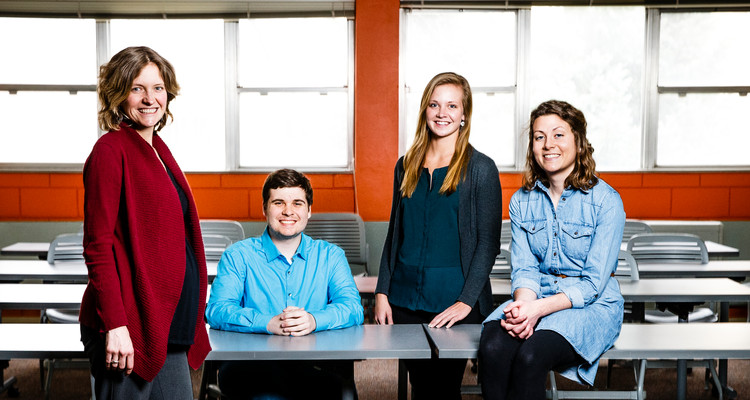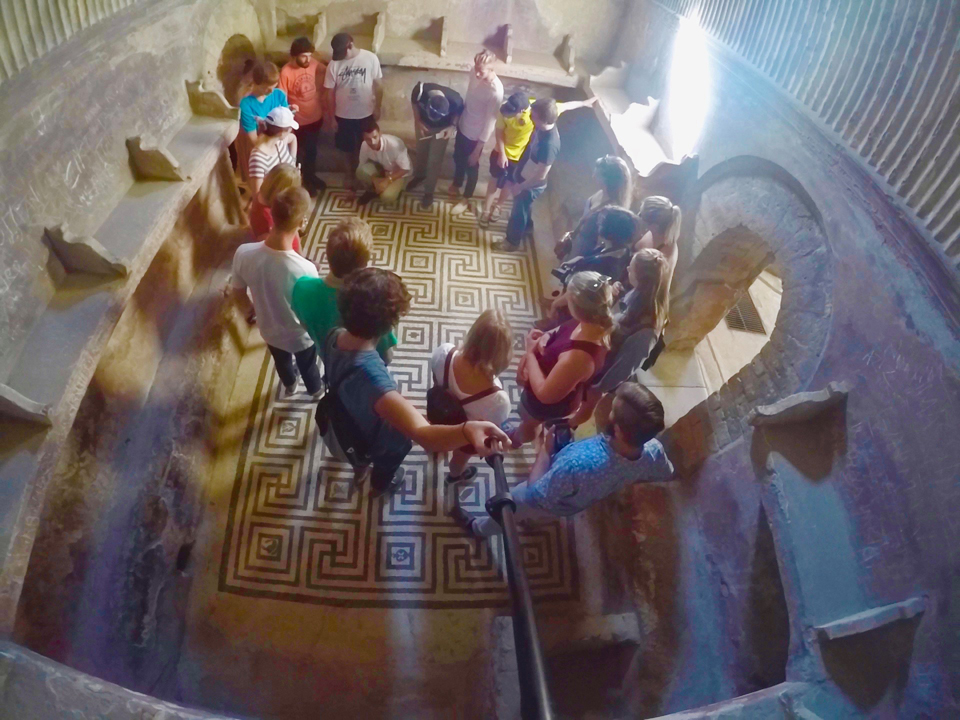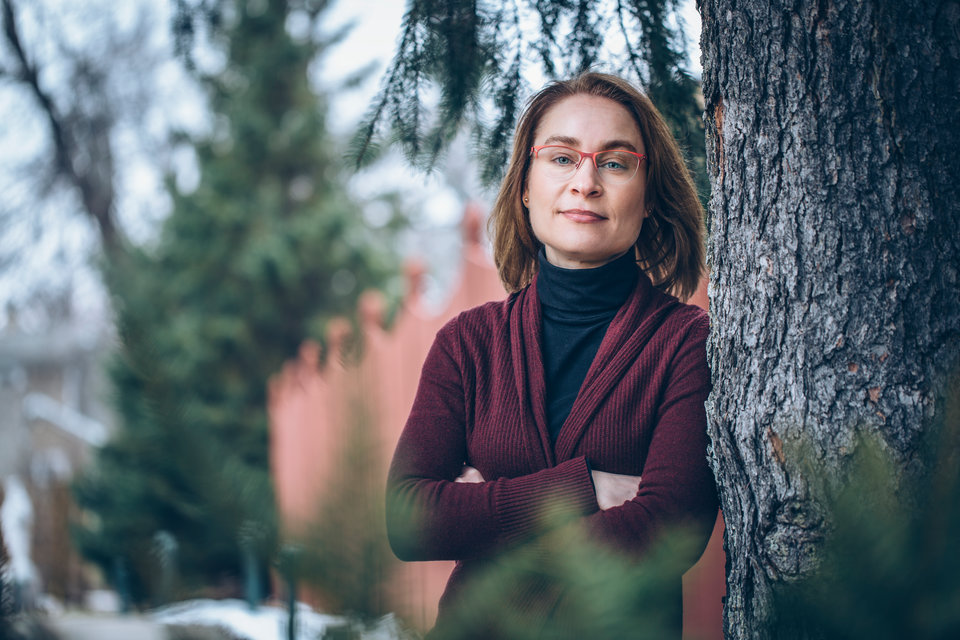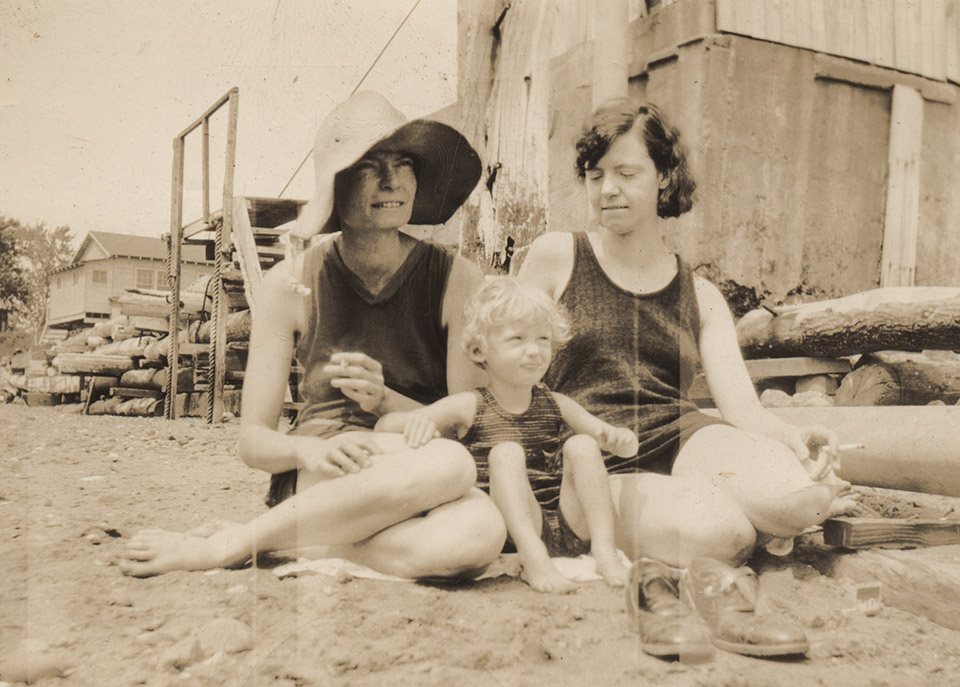The students and faculty in the Department of Justice and Peace Studies (JPST) have no shortage of topics to study today: the ISIL crisis in the Middle East, violence in Ukraine, intractable conflict in Israel and Palestine, growing global and domestic economy inequality, and racial tensions in the United States after incidents in Ferguson, Missouri. Indeed, the breadth of contemporary issues to examine through a JPST lens is one of the factors that has led to growth in the department.
Students say they’re also attracted to the department because of its praxis-based model of pedagogy and meaningful opportunities for experiential learning and civic engagement.
Kaitlyn Gathje ’15, who is double majoring in JPST and economics, says, “It is not a subject chained to the classroom; in fact, justice and peace studies is stifled if lecture and note taking is the only form it is undertaken in. Justice and peace studies is about something more. It is about the human heart, the inherent dignity of every human being, and it is about the action that must occur when these elements are attacked. Justice and peace studies is about our daily participation in life, inside but mostly outside of that classroom, and in the name of something greater than ourselves: in the name of human rights, of interconnection, of restorative justice, of positive peace. If this is not attractive, I am not sure what is.”
Students also enjoy the flexibility and relevance of applying a JPST perspective to other fields, such as politics, health, psychology, business and education. Students who couple their JPST major or minor with another major find that JPST allows them to engage the other discipline more critically.
Luis Ortega ’14 minored in JPST and majored in neuroscience.
“I knew that the course work would be of a very interdisciplinary nature, and the greater part of my studies as a student in the neuroscience program at UST really jived with the Justice and Peace Studies program in a surprising way,” he says. “Electing to pursue a minor in JPST was easily one of the best decisions I had made as an undergraduate.” Ortega says JPST “fostered curiosity in my life. (It) encouraged me and my peers to look at the world around us and question the status quo. The learning environments it introduced us to didn’t necessarily tell us that we should or must seek a career as a social justice activist on the caliber of a modern Gandhi or Martin Luther King, but it helped us explore causes to which we could directly contribute as citizens of the world.” Ortega hopes his contribution will come as a physician and public health practitioner.
“What are you going to do?”
Indeed, the aim of the JPST Department is preparing students to be responsible critics of contemporary societies and effective agents for positive social transformation. While “advancing the common good” is a familiar mantra at St. Thomas, given its central place in the university mission statement, students in JPST integrate the principle into nearly every aspect of their studies, their co-curricular engagements and their post-graduation lives. JPST conceptualizes “advancing the common good” both in terms of relieving suffering and of making positive changes to social structures that are, in fact, root causes of contemporary social problems such as poverty, war, racism and climate change. Through this perspective, peace work is not simply about ending violence but involves building a positive peace. Positive peace, a key concept in the JPST discipline, was developed by Norwegian sociologist Johan Galtung and expounds on the notion that “peace” is not only the absence of violence but is also the presence of systems of justice.
At St. Thomas, the seeds of the Justice and Peace Studies program were planted by professor emeritus Father David Smith, a theology professor who taught Scripture. In 1983, the U.S. Catholic bishops published a pastoral letter, “The Challenge of Peace: God’s Promise and Our Response,” calling all levels of Catholic education to engage themes pertaining to the ongoing nuclear arms race. Shortly thereafter, Archbishop John Roach asked Monsignor Terrence Murphy, then president of the College of St. Thomas, “So what are you going to do about our letter?” Murphy responded by creating an interdisciplinary faculty committee that was charged with “doing something about it.” From the beginning, a central goal of the group was to create a program that had a strong spiritual dimension, as well as significant research, writing and discussion components.
When the resulting program began in 1987, Smith mentored the handful of students who pursued JPST as a minor. In 1991, after several more students created individualized JPST majors, JPST became a major field interdisciplinary program operating out of the Theology Department. Several prominent activist-scholars, including Jack Nelson-Pallmeyer, were hired as adjunct faculty to teach JPST courses. Nelson-Pallmeyer became a full-time JPST professor in 1999.
Beginning in 2008, under the leadership of theology professor Gerald Schlabach, JPST engaged in a multi-year strategic planning process that led to curriculum revision and the creation of three major concentrations that currently are available to JPST students: leadership for social justice; public policy and analysis; and conflict analysis and transformation. The JPST concentrations reflect broad areas of scholarship in the discipline and are intended to guide students toward concrete skill development useful for post- graduation jobs in the nonprofit sector, in government agencies, in small business and for graduate school. Students also may elect a general JPST major or minor. With the new curriculum in place, the College of Arts and Sciences granted department status to JPST in 2012.
The Circle of Praxis
The JPST curriculum stems from the Circle of Praxis, a pedagogy of engaged learning with roots in liberation theology and Catholic social teaching. The Circle of Praxis is a four-stage iterative process that compels students into a method of studying and engaging the world. After completing the circle to examine a topic, students are invited to re-engage the insight, or engage a new one, with new insight and complete the circle again.
The starting point in the Circle of Praxis is Insertion, in which students are introduced to a direct or indirect experience of poverty, injustice, violence or marginalization. Students are asked to challenge their own worldviews and to have a more intimate experience with some of the difficult realities of our world. Many students fulfill this through off-campus experiences available through local urban studies programs, study abroad programs, VISION trips or volunteer experiences.
The circle’s second stage, Descriptive Analysis, requires students to empirically study the economic, political, social, historical and cultural realities of a society, paying particular attention to who has power to make meaningful decisions in a situation and who does not.
The third stage in the circle is Normative Analysis, in which students are asked to analyze the moral implications of the social reality. In this stage, students ask existential questions, such as “What is good and bad in this situation? What is right and wrong here? What are alternative possibilities?”
Fourth in the circle comes Action Possibilities, a phase that emphasizes identifying policies, strategies, skills and actions to transform society from its present condition to a better condition.
Justice and Peace in the “Real World”
Because JPST is grounded in the conviction that education is a transformative endeavor – we teach and learn not to simply gather new knowledge but to impel one another to change unjust structures in the world – all JPST courses require, to some degree, that students explore concrete responses to the challenges of injustice they have studied; furthermore, all JPST majors have the opportunity to begin acting while exploring post-university vocations through a required internship. JPST students have pursued fascinating opportunities for networking, for skill-building and for career discernment.
Christine Rintoul ’14 interned at the Isis Rising Prison Doula Program, protecting the rights of both incarcerated women who are pregnant and their children. After graduation she completed another internship with the Holy See Mission at the United Nations. Adam BenSalem ’15 interned with the Iraqi and American Reconciliation Project. As a Kuwaiti student, BenSalem used his unique social location and Arabic language background to translate correspondence between Iraqis and Americans to improve their communications and relationships. Kate Weyenberg ’16 recently interned with WATCH MN as a courtroom monitor, attempting to make the justice system more effective and responsive in handling cases of violence against women and children, and to create a more informed public.
Current full-time JPST faculty are Nelson-Pallmeyer; Mike Klein, who has taught in the program since 1998; and Amy Finnegan, who arrived in 2013. Schlabach remains a key partner faculty member teaching in JPST, and Jeanne Zimmer, who is executive director of the Dispute Resolution Center in St. Paul, regularly teaches JPST courses as an adjunct faculty member.
In addition, JPST is guided by a council of 11 faculty and staff affiliates from across the university.
Nelson-Pallmeyer is a scholar-activist who has focused his life and work on linkages between faith and critical political, economic and social issues. Currently, he is exploring the expansive costs of militarized foreign policies and federal budget priorities that privilege military spending; the broad implications of climate change; and issues related to religion and violence within the sacred texts of Jews, Christians and Muslims. Klein is finishing a book that examines how to democratize leadership to counter the hegemony of domination and promote structures for collaborative peace building. Finnegan, who also serves as JPST department chair, studies health equity and how student activists can work more effectively outside their home communities.
Current and former students credit the JPST faculty’s roles in their own development. Tim Stammeyer ’16, a double major in JPST and elementary education, says, “The faculty members are the most knowledgeable and approachable professors at the University of St. Thomas. While experts in their field, they emphasize individual mentoring relationships to help students succeed.”
Ciara Parks ’16, a JPST major who is studying abroad in Northern Ireland, identifies a sense of community she feels in the department: “I feel very supported and encouraged not only by my fellow students majoring in justice and peace studies, but also the professors in this department, who are so supportive and conscientious, pushing me to be a more thoughtful and well- rounded individual.”
Sarah King ’10, who majored in JPST and political science, and now works for the Minnesota Circles of Support and Accountability program within the Victim Assistance/Restorative Justice Unit at the Minnesota Department of Corrections, says that “JPST faculty worked tirelessly to maintain a space for critical thought and organic expression. ... The program challenged my privileged presuppositions, encouraged me to find creative ways to work toward positive social change and taught me that great things can be accomplished with thoughtful persistence and humble bravery.”
Certainly, studying the world’s gravest injustices is challenging and can be quite distressing for both students and faculty. Klein says students’ energy and commitment keep him inspired. “They are not waiting to be the ‘leaders of tomorrow.’ They step into leadership while they are undergraduates to address institutional and societal concerns. They graduate to continue that role.” As examples, Klein points to Samali Mutazindwa ’14, who is promoting dispute resolution in St. Paul communities; to Evan LaRuffa ’05, who is connecting the arts to organizational development in Chicago; to Michaelina Jakala ’02, who is conducting research with civilian victims of war and marginalized groups in Bosnia-Herzegovina; and to Jesse Lecy ’01, who teaches in Syracuse, New York, and is developing online micro-foundations for community development.

Samali Mutazindwa '14
Many JPST students seize opportunities to practice their analysis and implementation skills through the student organization Students for Justice and Peace, which Klein advises. Josh Zahrbock ’14, who majored in JPST and history, and is teaching English near Osaka, Japan, says his favorite part of being a JPST major was “being able to learn theory in the classroom, but then having the opportunity to put the theory into practice in Students for Justice and Peace.” Zahrbock and fellow Students for Justice and Peace members played a key role in bringing fair-trade coffee to campus food and beverage services. The club’s members also are working with the bookstore and Purchasing Services to ensure students have the opportunity to purchase ethically produced sweatshop-free apparel.
Observing the good work of the St. Thomas JPST program, several universities across the United States have used the program as a model. Department faculty are writing a seminal introductory textbook, which they hope will help shape the entire discipline. Looking ahead, the faculty seek to continue attracting students to join the JPST program, which numbers between 50 and 60 majors and minors; to develop new courses that respond to both student and community needs; and to engage the university overall in institutional change that addresses both justice and peace.
As Stammeyer says, “I have learned that peace is not a foreign ideal or unattainable goal. Peace is now; peace is present; peace is us. I can work for justice and peace through my interactions with other students. The skills I learned from justice and peace classes are the most important pieces of information I will ever learn. At the end of the day, I will forget plenty of facts and historical dates, but I will always remember the essential teachings of peace studies and the unrelenting hope that JPST classes bring to the University of St. Thomas.”
Read more from CAS Spotlight.





